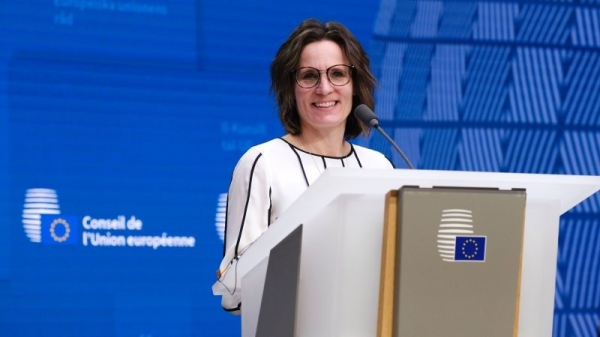EU opens up €800bn recovery fund to financing of Russian fossil fuel exit

The European Union completed a reform on Tuesday (21 February) that will see energy independence objectives added to the bloc’s €800 billion recovery fund adopted two years ago in the wake of the coronavirus pandemic.
The new objectives are described in a plan called REPowerEU, adopted by the European Commission last May in response to Russia’s invasion of Ukraine.
“The purpose is to strengthen the strategic autonomy of the EU by diversifying its energy supplies and ending its dependency on Russian fossil fuel imports,” said a statement from the Council of the European Union, which represents the bloc’s 27 member states.
“In practical terms, member states will be able to add a new REPowerEU chapter to their national recovery and resilience plans (RRPs),” the statement said, referring to the plans that governments need to submit to Brussels before they can access the loans and grants available under the bloc’s €800 billion fund.
The Commission’s REPowerEU plan is focused chiefly on increasing the uptake of renewables, with new provisions making solar rooftops mandatory in new buildings, as well as measures to boost energy efficiency and energy storage capacity.
To be eligible, 37% of spending will need to go to “green expenditure”, explained a senior Commission official who briefed journalists on Tuesday about the updated objectives.
In addition, more than a third of spending needs to be assigned to cross-border projects, which is “defined in a broad way” to include also renewables and energy efficiency projects because they enhance security of supply “and hence have a cross-border nature”, the official explained.
EU countries are invited to send their updated national recovery plans with REPowerEU chapters before 31 April. The aim is for the revised plans to be in force “by the summer”, the official said.

EU tables €300bn plan to ditch Russian fossil fuels, speed up green transition
The European Commission submitted on Wednesday (18 May) a €300 billion plan to eliminate Russian energy imports by 2027, although it admitted this would require short-term investments in new fossil fuel infrastructure to replace imports of Russian oil and gas.
Oil and gas supply diversification
The REPowerEU plan also includes about €10 billion in financing for missing gas infrastructure and up to €2 billion for oil infrastructure in view of stopping the shipment of Russian oil to Europe, the Commission indicated when it presented its plan last year.
Yet, spending comes with “a number of restrictions”, the Commission official indicated.
Fossil fuel infrastructure, for instance, “cannot amount to more than 30% of the overall REPowerEU” spending.
“And when we say fossil fuel infrastructure, for almost all the member states it’s only gas,” the official added, saying only three countries – Hungary, Czechia and Slovakia – are eligible for oil infrastructure spending because of their direct dependence on Russian oil delivered by pipeline.
For gas infrastructure, “additional requirements” were added to ensure EU spending directly addresses the security of supply issues. Eligible projects have to make a contribution to regional supply security and “be in operation by 2026”, the official said.
Additional grants worth €20 billion will be made available to finance the exit from Russian fossil fuels. Those will be taken from the EU carbon market – with 60% coming from the Innovation Fund and 40% from frontloading carbon allowances.
Furthermore, €5.4 billion is being redirected from the EU’s Brexit adjustment reserve to finance the REPowerEU objectives.
EU countries have one month to indicate whether they want to tap into the €225 billion loans available under REPowerEU.
“Why only one month? Because we want to redeploy the loans of member states who are not interested” to those who want to take more, the official said.

Deal struck on EU plan to finance Russian fossil fuel exit
The European Union reached an agreement early Wednesday morning (14 December) on a new law that makes energy projects eligible for financing under the EU’s €800 billion recovery fund, agreed two years ago in the wake of the COVID-19 pandemic.



